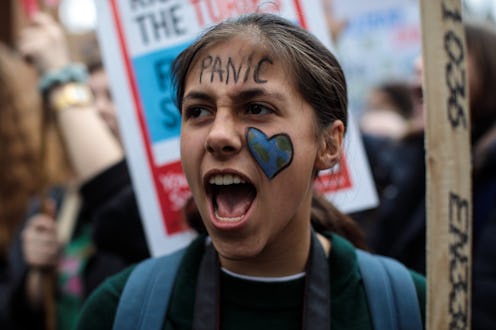Life
Why Your Actions Absolutely Make A Difference In The Fight Against Climate Change

Climate change is an enormous global problem — and thinking about how you alone can help tackle it can feel overwhelming, to say the least. It's completely normal to question whether one person can make a difference in the fight against climate change, but don't discount your voice just yet. According to climate and environmental science experts, personal conservation and advocacy efforts play a key role in protecting the planet and influencing others to get on board.
As the Natural Resources Defense Council (NRDC) noted in February 2019, corporations are largely culpable for climate change, with a CDP (formerly the Carbon Disclosure Project) report finding that 100 energy companies are responsible for 71% of the globe's greenhouse gas emissions. Moreover, governments that fail to regulate these corporations' actions — and the broader use of resources — also bear significant responsibility for the climate change crisis, Amnesty International noted.
While you can't exclusively blame climate change on any one handful of individuals, your own actions still affect the planet. And personal initiatives to fight climate change, when multiplied, carry the potential to have a significant ripple effect.
Katharine Davis Reich, M.A., an associate director of the UCLA Center for Climate Science, emphasizes this point when discussing how at-home efforts, like recycling and water conservation, can make a difference in countering global warming. "Collective action to reduce carbon emissions is absolutely necessary," Reich tells Bustle. "But collective action can't possibly happen if individuals throw up their hands and decide not to pitch in."
Reich adds that efforts to reduce your own environmental footprint can also inspire others, increasing your impact. "With everything you do, you're a model for your family, your friends, and your neighbors," she says. "Talk about what you are doing to reduce your carbon footprint, and why, and you'll help to create a culture of change."
Dr. Gabrielle Wong-Parodi, Ph.D., a behavioral scientist at the Stanford School of Earth, Energy & Environmental Sciences, agrees that personal actions can quickly multiply. Individual action on climate change "makes a difference because we are social beings. So, when we see one another start to take climate change or environmental issues seriously, it becomes real," she says to Bustle. "And when one person takes an action, another person may take that action, and then another person may take an action. It's sort of like a snowball that rolls downhill and picks up additional snow and then it just gets bigger and starts to have a life of its own."
Wong-Parodi emphasizes that, when this happens, "we start to see a change or shift in social norms," including changes in how society as a whole approaches climate change.
Dr. Michael Notaro, Ph.D., the associate director of the Nelson Institute Center for Climatic Research at the University of Wisconsin-Madison, is on the same page and offers some tips on what exactly you can do to decrease your environmental impact.
"An individual can help the global effort to tackle the climate change dilemma by being part of the collective solution, making bold decisions and sacrifices, and sharing their personal decisions with the community as a positive influence," Notaro explains to Bustle. "These personal decisions could include the use of a bike or public transit rather than a car, adjusting one's thermostat to reduce utility use, washing laundry in cold water, purchasing energy star appliances, reducing meat in one's diet, planting trees, and calculating one's carbon footprint to make those tough decisions."
While personal conservation efforts are important, experts stress that pushing for larger climate change solutions is just as crucial. "The structural changes needed to decrease reliance on fossil fuels need large policy changes," Dr. Amir Jina, Ph.D., an assistant professor at the University of Chicago's Harris School of Public Policy, tells Bustle. "Using your voice to call for changes, through voting, protest, writing, art, or any other kind of activism, is the best way to motivate creative policies that will bring about solutions." Jina adds that it's important to remain consistently committed to activism because "it's not a sprint, it's a marathon, and changes won't happen overnight."
Reich, of UCLA, similarly stresses the importance of political activism when discussing how individuals can help curb climate change. "If you do nothing else, get politically engaged and support climate-serious candidates at local, state, and federal levels," Reich tells Bustle. These candidates are more likely to help craft policies that hold companies and countries more accountable for protecting the environment.
In fact, teenage activist Greta Thunberg demonstrated just how powerful individual advocacy can be when her decision to regularly skip class to raise awareness about climate change outside of the Swedish Parliament helped inspire a global climate activism movement. This movement is known as Youth Strike 4 Climate — and it helps coordinate youth-led climate protests around the world.
If you find yourself wondering whether your own actions really matter when it comes to climate change, the answer is "absolutely," Dr. Notaro says. "Be a leader within your local community and watch as that small flame spreads like a wildfire to the county, state, nation, and world to fuel the ever-critical environmental movement to protect our planet."
This story is part of Covering Climate Now, a global collaboration of more than 250 news outlets to strengthen coverage of the climate story.